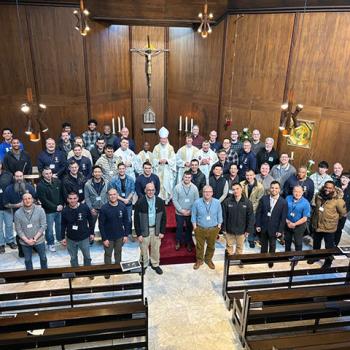The Vatican's recent censure of Dr. Margaret Farley RSM for her book, Just Love, is simply the most recent volley in an old battle: The war on women theologians. It's now part of the larger cultural and political war on women, and it has had the same results as the condemnation of another woman theologian, Elizabeth Johnson, in 2011: Increasing sales of the book and galvanizing women activists, progressives, and theologians of all sorts.
While the two cases differ in some details—Johnson's book Quest for the Living God is part of her theological work on female images and language for God while Just Love explores myriad issues involved in developing a contemporary Christian sexual ethic—there are two common elements: The condemned author is a woman, and she is writing explicitly about gender and sexuality in ways that depart from white patriarchal heterosexual norms rigidly maintained by the Roman Catholic Church and defended by the Vatican.
This second element is also why many Latin American liberation theologians have been condemned by, silenced, and excommunicated from the Church over the years: For their thinking beyond the norms that also calls attention to poverty as a byproduct of capitalism and corporate political influence. Today it is women of faith, like Farley and Johnson and the Leadership Conference of Women Religious, disturbing the male church hierarchy by doing the work of justice that takes place on the margins of dominant society, where race has as much to do with oppression as class, gender, and sexuality.
A collection of Lutheran women working in theological and religious studies signed on to "An Open Letter to Elizabeth A. Johnson" in 2011, written by ELCA Director of Justice for Women Mary J. Streufert. Many of those women again lit up my email inbox in early June with stories of Sister Farley's teaching, mentoring, and substantial scholarly work. Calls for a letter of support and offers to report on it via various online media were mixed in with memories and gratitude. The result, "An Open Letter to Dr. Margaret Farley," was signed by over seventy Lutheran women scholars from around the globe.
Additionally, Marie Fortune penned a wonderful letter to the Vatican in which she expresses the perverse glee that many feel when another one of these condemnations comes down. While Farley and Johnson have defended their work and its place within Catholic theological and ethical discourse, censure and condemnation usually now serve to call more attention to the work of the one silenced, and motivates legions of progressive Christians to support, read, and champion their work.
Women have often held a special place in church history among those silenced and excluded. The ordination of women to ministry and priesthood, while common in many denominations in the 21st century, has never been a settled theological issue and church practice. Plenty of Christian churches continue to reserve highest authority for men, while insisting on male-only imagery and language for God. Late medieval persecution and execution of "witches" had a decidedly gendered element, with a large majority of those accused and murdered being women. In 19th-century United States, many new religious movements emerged, and the appearance of women at the helm of several like the Church of Christ, Scientist, the International Church of the Four Square Gospel, the Seventh Day Adventist Church, as well as women's social activism around abolition and temperance, points to a way in which women have often alternative ways to answer their calls to ministry and leadership. Indeed, women evangelists of the 19th century have left a powerful canon of texts and stories in which they claim their authority as given from God.




